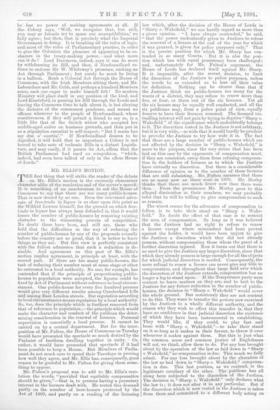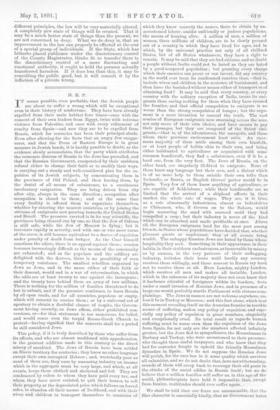MR. ELLIS'S MOTION. T HE first thing that will strike the
reader of the debate on Mr. Ellis's motion is the curiously elementary ,character alike of the resolution and of the mover's speech. It is something of an anachronism to ask the House of Commons to say that there are too many public-houses. That is now denied by no one. Even the convinced advo- cate of free-trade in liquor is as clear upon this point as Sir Will Lawson himself, for the ground on which free- trade in liquor has always been defended is, that it would lessen the number of public-houses by removing existing obstacles to the winnowing process of competition. No doubt there have been„ and still are, those who hold that the difficulties in the way of reducing the number of public-houses by any of the proposals actually before the country are so great, that it is better to leave things as they arc. But this view is perfectly consistent with the fullest admission that such a reduction is de- sirable. And agreement on this part of Mr. Ellis's motion implies agreement, in principle at least, with the second part. If there are too .many public-houses, the task of reducing their number must at some stage or other be entrusted to a local authority. No one, for example, has contended that if the principle of proportioning public- houses to population were accepted, the figures could be fixed by Act of Parliament without reference to local circum- stances. One public-house for every five hundred persons would give very different results among Cumberland fells and among East London streets. But regulation according to local circumstances means regulation by a local authority. So, too, does the principle which is furthest removed from that of reference to population,—the principle which would make the character and conduct of the publican the deter- mining consideration in the renewal of licences. Personal supervision is essentially a local process. It cannot be carried on by a central department. But for the inter- position of Mr. Fulton, the House of Commons on Tuesday would have presented the spectacle so much desired by the Psalmist of brethren dwelling together in unity. Or, rather, it would have presented that spectacle if it had been possible to keep a House. But Members of Parlia- ment do not much care to spend their Tuesdays in proving how well they agree, and Mr. Ellis has, consequently, good reason to be grateful to Mr. Fulton for giving them some- thing to oppose.
Mr. Fulton's proposal was to add to Mr. Ellis's reso- lution the words, "provided that equitable compensation should be given,"—that is, to persons having a pecuniary interest in the licences dealt with. He rested this demand partly on the number of beer-houses protected by the Act of 1869, and partly on a reading of the licensing law which, after the decision of the House of Lords in "Sharp v. Wakefield," we can hardly regard as more than a pious opinion. "I have always contended," he said, "that the power undoubtedly given to Justices to refuse the renewal of a licence at the end of the year for which it was granted, is given for police purposes only." That is the precise position for which Mr. Sharp has con- tended in so many Courts. But it is also the posi- tion which has with equal persistency been challenged ; and, unfortunately for Mr. Fulton's argument, the House of Lords has declared itself against Mr. Sharp. It is impossible, after the recent decision, to limit the discretion of the Justices to police purposes, unless the words be so extended as to lose all their value for definition. Nothing can be clearer than that if the Justices think six public-houses too many for the wants of a, district, they may refuse to renew more than five, or four, or three out of the six licences. Yet all the six houses may be equally well conducted, and all the six publicans may, from a police point of view, equally deserve to have their licences renewed. The licensed Vic- tualling interest will not gain by trying to deprive" Sharp v. Wakefield" of the significance which undoubtedly belongs to it. The discretion vested in the Justices is not arbitrary, but it is very wide,—so wide that it would hardly be prudent to provoke the Justices to try how wide it is. The fact that there are a large number of public-houses which are not affected by the decision in "Sharp v. Wakefield," is more to the purpose, since the very stress that has been laid on this case by the opponents of compensation must, if they are consistent, estop them from refusing compensa- tion to the holders of licences as to which the Justices have virtually no discretion. But there is a considerable difference of opinion as to the number of these licences that are still subsisting. Mr. Fulton assumes that there are as many now as there were in 1870. Mr. Morley thinks that there are much fewer now than there were then. From the prominence Mr. Morley gave to this alleged diminution in their numbers, we may probably infer that he will be willing to give compensation to such as remain.
The wisest course for the advocates of compensation to follow, is to take their stand on Sharp v. Wake- field." No doubt the effect of that case is to restrict the area of compensation. So long as it was believed that the Justices had. no right to refuse to renew a, licence except where misconduct had been proved against the holder, it would have been unjust to give the Justices a discretion which they did not already possess, without compensating those whom the grant of a further discretion injured. Now it turns out that there is no need to give the Justices any larger discretion, since that which they already possess is large enough for all the objects for which judicial discretion is needed. Consequently, the mere refusal to renew a licence can never give any title to compensation, and throughout that large field over which the discretion of the Justices extends, compensation has no Linger a leg to stand upon. If the Temperance party were content to leave matters as they are, and to look to the Justices for any future reduction in the number of public- houses, the decision in "Sharp v. Wakefield" would cover the whole ground. But notoriously they are not content to do this. They want to transfer the powers now exercised by the Justices to a wholly different authority, and the reason why they wish to effect this transfer is, that they have no confidence in that judicial discretion the existence of which they have been instrumental in establishing. They would like, if they could, to play fast and loose with "Sharp v. Wakefield,"---to take their stand on it so long as it makes in their favour, to throw it over whenever it makes against them. But this is just what the common sense and common justice of Englishmen will not, MT think, allow them to do. For any loss brought about by the operation of the law as laid down in "Sharp v. Wakefield," no compensation is due. This much we fully admit. For any loss brought about by the alteration of the law as laid 'down in "Sharp v. Wakefield," compensa- tion is due. This last position, as we contend, is the legitimate corollary of the other. The publican has all along been subjected to the discretion of the Justices. The decision in ' Sharp v."Wakefield " only declares what the law is ; it does not alter it inany particular. But if the discretion which is now vested in the Justices is taken from them and. committed to a different body acting on
different principles, the law will be very materially altered. A completely new state of things will be created. That it may be a much better state of things than the present, we are not concerned to deny. What we do deny is, that an improvement in the law can properly be effected at the cost of a special group of individuals. If the State, which has hitherto placed publicans under the discretionary control of the County Magistrates, thinks fit to transfer them to the discretionary control of a more fluctuating and emotional authority, it ought to hold the persons actually transferred harmless. If it does less than this, it may be consulting the public good, but it will consult it by the infliction of a private wrong.







































 Previous page
Previous page